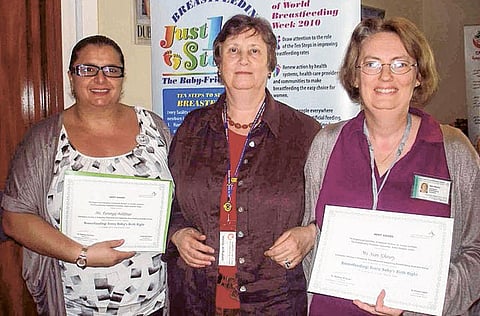Help for breastfeeding mothers in UAE
This mother wanted to help other women who found it difficult to breastfeed their babies with the strong pressure around them to do otherwise

The World Health Organisation (WHO) estimates that 1.4 million lives per year would be saved if all infants were breastfed during the first six months of their life.
These deaths are not just occurring in the developing world — a recent study by infant nutrition expert Linda Folden Palmer concludes that not being breastfed doubles an infant's chance of neo-natal death in the US, arguably one of the most developed countries in the world. However, breastfeeding is not only important in the prevention of deaths, such as those from sudden infant death syndrome and necrotising enterocolitis, but not being breastfed also increases the risk of lower respiratory tract infection, severe gastroenteritis, otitis media, allergies, eczema, urinary tract infection, childhood cancers, diabetes, dental problems and — later in life — hypertension and obesity, wherever in the world you live.
And all this doesn't touch on the fact that breastfeeding is important for a mother's health too, or on the significant economic, psychological, and ecological benefits.
Breastfeeding initiation rates in the UAE are high, and there are clear recommendations from WHO that advocate breastfeeding for at least two years alongside complementary foods once the baby is ready. Yet, the United Nations Children's Fund (Unicef) reports only one in three babies in the UAE is exclusively breastfed at the age of six months.
Many mothers wish to breastfeed, but a combination of inaccurate information and lack of help when things do not go as planned leave them little choice but to introduce artificial formula. This should actually be the fourth choice when it comes to infant feeding, according to WHO, after breastfeeding, mother's expressed milk, and milk received from another mother.
Breastfeeding is said to be natural but not instinctual; it is a skill learned by both mother and child and since the introduction and subsequent aggressive marketing of infant formula, it is a lost art in this and many societies worldwide. Few new mothers today are lucky to have grown up seeing breastfeeding around them, or to have the skilful support of other women in their families and communities.
No one to turn to
Healthcare professionals are not routinely trained in breastfeeding management, and when a mother experiences doubts or problems, there is usually no one to turn to. Bombarded by images of bottle feeding in the popular media, and surrounded by a culture which regards formula as the norm, many mothers experience pressure to give up breastfeeding.
We often hear of mothers being ‘bullied into breastfeeding', but for many mothers who wish to breastfeed, the reality is quite the opposite. They are often told that just one bottle won't hurt and that there's no difference between formula and breast milk, when what they really want is a bit of encouragement or practical help.
This is why community support groups such as Breastfeeding Q&A, founded by mother-of-three Farangis Bakhtiar five years ago, are so vitally important in supporting families.
Research has found these groups are an effective way of increasing breastfeeding rates in areas where new mothers have few breastfeeding role models and a bottle-feeding culture predominates. No such groups existed in Dubai when Farangis Bakhtiar had her first child ten years ago.
She said: "I wanted to breastfeed, but I just didn't know how. In the hospital where they were born, everything was fine but when I got home, everything fell apart. I didn't know how to make sure he was getting enough milk, or to check that he was latched okay."
Her breastfeeding relationship with her son lasted only a short time and it was a similar story with her second son. However, when she was five and a half months pregnant with her third child, she promised herself that things would be better. A chance online encounter with a breastfeeding counsellor led to her receiving the support she so desperately wanted.
Empowered
The counsellor, via e-mail, taught Farangis how to hold her baby, what to pay attention to, and where to get evidence-based information.
Empowered with knowledge, when her daughter was born in March 2005, she knew what she was doing.
She said: "Within the first few hours everything came together. It was a completely different experience than with my first two children."
Grateful for the online help she had received, Farangis set up an online support group for breastfeeding mothers.
Since its inception in August 2006, Breastfeeding Q&A has had more than 260 members and aims to help mothers to breastfeed through mother-to-mother support. The group's main activity is its online forum, but it also publishes a newsletter, offers information and support over the telephone, and recently teamed up with health and lactation professionals at Al Wasl Hospital to offer a morning seminar for expectant and breastfeeding mothers.
Farangis said: "It's my way of paying it forward." Mothers can join the group: http://groups.yahoo.com/group/breastfeedingqa, visit the Facebook page: ‘Breastfeeding Q&A UAE' or email breastfeedingqa@yahoo.com for more information.
— The reader is a registered breastfeeding counsellor with the Association of Breastfeeding Mothers and is based in Fujairah
Be a citizen reporter. Tell us what is happening in your community. Write to us and send us your videos and pictures at readers@gulfnews.com.



